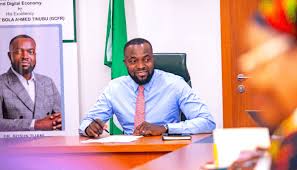The Federal Government has revealed that Nigeria’s Communications and Digital Economy sector attracted $191 million in foreign direct investment (FDI) in the first quarter of 2024, a major jump from the $22 million recorded in the same period in 2023.
Minister of Communications, Innovation, and Digital Economy, Dr. Bosun Tijani, made the announcement during an interview for an upcoming documentary by the State House to mark President Bola Ahmed Tinubu’s second year in office.
The update was also confirmed in a statement released by the Special Adviser to the President on Information and Strategy, Mr. Bayo Onanuga. In the statement titled ‘Investment in Digital Economy Grows Ninefold, Rollout of $2bn Fibre Optic Infrastructure Begins Q4: Bosun Tijani’, the minister said Nigeria’s digital sector is undergoing transformational changes.
Dr. Tijani said the government is preparing to invest $2 billion in a fibre optic infrastructure project called Project Bridge. The project, which will begin in the fourth quarter of 2025, aims to deploy 90,000 kilometres of fibre optic cables across the country to improve internet access.
He explained that improved connectivity can boost economic growth. “Increasing connectivity hubs by just 10 per cent could increase GDP by 2.5 per cent,” he said. The project is expected to help achieve 98 per cent internet coverage in the country by 2025, in line with the National Broadband Plan. This is a big jump from the current 48 per cent coverage.
He added that over 12 states have already adopted zero charges for Right-of-Way (RoW), making it easier to lay cables for broadband internet. According to him, this development is a game-changer and a sign of better collaboration between federal and state governments.
The minister also shared progress made in human capital development through the Three Million Technical Talent (3MTT) programme, which was launched in October 2023. The programme has already trained over 117,000 Nigerians in digital skills, far exceeding its original target of 30,000 trainees. An additional 35,000 individuals are currently undergoing training, and the government aims to reach 3 million before the end of President Tinubu’s administration.
Dr. Tijani also spoke about Nigeria’s rising influence in artificial intelligence. He said the country is now ranked among the top 60 nations for AI readiness. The government has developed a local Large Language Model and launched an AI Collective platform in partnership with global tech firms like Google, Microsoft, and Pierre Omidyar’s foundation.
He noted that the ministry has also supported academic research by funding 55 Nigerian researchers to explore technology applications in areas like healthcare, education, and agriculture. In addition, N300 million has been invested in 10 local startups that use artificial intelligence and blockchain to boost agricultural productivity.
On the global stage, the government launched the Nigeria Startup House in San Francisco to attract $5 billion in investments for Nigerian tech startups. The initiative is supported by the Startup Pact and Trade Desk, which aim to connect Nigerian startups with international funding and government contracts.
Dr. Tijani further revealed that over 500 public servants have been trained in Artificial Intelligence and Digital Public Infrastructure. He added that the landmark Digital Economy Bill has passed its first reading in the National Assembly and is expected to become law soon.
The Minister said the government is also planning to deploy 7,000 new telecom towers across the country to support its coverage goals and ensure all Nigerians, regardless of location, can access affordable and reliable internet services.
Tijani concluded that the government is not looking for short-term success but focused on long-term reforms that will shape the future of Nigeria’s economy. “Technology allows us to bridge the gap between government and the people. The reforms we are putting in place today are for generations to come,” he said.
